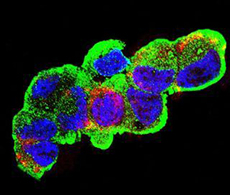Guide to Primary Antibody Types
- ‹ Primary Antibodies
- Guide to Primary Antibody Types
- Recombinant Antibodies
- Monoclonal Antibodies
- Recombinant Rabbit Monoclonal Antibodies
- Polyclonal Antibodies
- Conjugated Primary Antibodies
- Control Antibodies
- Epitope Tag Antibodies and Related Antibodies
- Research Area Antibodies
- Signal Pathway Antibodies
- Cell Marker Antibodies
- Rabbit Monoclonal Antibodies

Commercially available primary antibodies are produced in many ways, and these differences yield antibodies with unique characteristics that affect their suitability for different applications. Knowing the characteristics of each type of antibody is important for choosing the best one for your research. In addition to “polyclonal” and “monoclonal” antibodies, there are now several other types or subtypes of primary antibodies to select from when choosing antibodies for particular research requirements. Use our antibody search tool above to explore our portfolio of high-quality antibodies research areas such as cancer, epigenetics, immunology, neuroscience, and stem cells. The information on this page will help guide your antibody selection.
Recombinant rabbit monoclonal antibodies are derived from rabbit monoclonal antibody-producing cell lines by isolating and cloning the specific antibody heavy and light chain DNA sequences. Rabbit monoclonal recombinant antibodies are produced from one clone isolated from a clone library.
Benefits:- High specificity and sensitivity due to using the full rabbit natural repertoire
- Lot-to-lot consistency due to recombinant production
- In development application screening, antibodies are generated to work in the desired application
- Single-epitope binding found in monoclonal antibodies
- Animal origin–free production
- Banked as DNA instead of cells
- No multiple-epitope binding
ABfinity Recombinant rabbit polyclonal antibodies are derived from rabbit monoclonal antibody-producing cell lines by isolating and cloning the specific antibody heavy and light chain DNA sequences. ABfinity oligoclonalRabbit monoclonal recombinant antibodies are produced from multiple clones in the clone library.
Benefits:- High specificity due to using the full rabbit natural repertoire
- Lot-to-lot consistency due to recombinant production
- In development application screening, antibodies are generated to work in the desired application
- Multiple-epitope binding created by expressing a library of DNA that shows positive binding
- Animal origin–free production
- Banked as DNA instead of cells
- No single-epitope binding
- May see more cross-reactivity due to multiple-epitope binding
Phage display recombinant monoclonal antibodies are expressed when DNA sequences encoding an antibody’s variable regions are fused with a bacteriophage’s genes that encode the coat protein. Thus, the phage’s coat expresses an antibody fusion protein on its surface.
Benefits:- Lot-to-lot consistency due to recombinant production
- Single-epitope binding
- Animal origin–free production
- anked as DNA instead of cells
- Phage display antibodies can show reduced affinity compared to antibodies raised in animals
- Phage display antibodies lack glycosylation
- No multiple-epitope binding
Monoclonal antibodies are hybridoma-derived. Their production involves immunizing animals (most commonly mice), isolating their spleen cells, and fusing those cells with partner cells. The hybridoma cells are then characterized, and the best clone is selected for antibody production.
Benefits:- Lot-to-lot consistency due to banking of hybridomas
- Single-epitope binding
- Monoclonal antibodies can exhibit cell drift over time
- No multiple-epitope binding
- Need to consider isotype-specific nature of monoclonal antibodies
Rabbit monoclonal antibodies are hybridoma-derived. Their production involves immunizing rabbits, isolating their spleen cells, and fusing those cells with partner cells. The hybridoma cells are then characterized, and the best clone is selected for antibody production.
Benefits:- High specificity due to using the full rabbit natural repertoire
- Single-epitope binding
- Single isotype in rabbits
- Rabbit hybridomas can exhibit more rapid cell drift over time than mouse hybridomas
- No multiple-epitope binding
Polyclonal antibodies are B cell–derived from an animal immunization. The antibodies are purified from the animal’s serum and consist of many different antibodies that bind to different epitopes on the antigen.
Benefits:- Multiple-epitope binding
- igh reactivity due to using the full natural repertoire
- Lot-to-lot variability with each animal immunization
- No single-epitope binding
- Higher likelihood of cross-reactivity due to multiple-epitope binding
Antibody applications
The different types of recombinant, monoclonal, and polyclonal antibodies may be used for a variety of research applications. In many cases, each type of antibody may be used for the following techniques, albeit with different quality and consistency:
Resources
- Product selection guides
- Immunoassay Selection Guide
- Cell Staining Tool
- Fluorescence SpectraViewer
- Learning and support
- Antibodies Learning Center
- Cell Analysis Support Center
For Research Use Only. Not for use in diagnostic procedures.